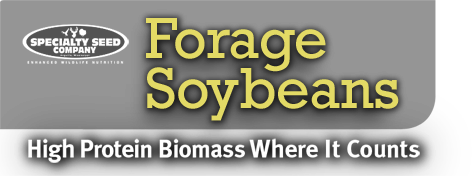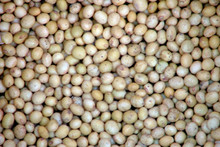 Loading... Please wait...
Loading... Please wait...Shop by Variety
Phone (662) 836-6451
Fax (662) 836-3194
Office Hours (Central)
Mon-Sat: 7:30-5:30
Sunday: Closed
Our Newsletter
Product Description
Tyrone Forage Soybean Seeds
Tyrone forage soybeans are the #1 non-GMO forage soybean. Though they were developed for the southeastern United States, they have been grown successfully in Canada, the Midwest, and northeastern United States. They are an indeterminate, maturity group 7 variety. Tyrone holds the seed better in its pod than ag type soybeans, protecting seed quality.
Tyrone Non-GMO Forage Soybean Information
-
Description: Tyrone forage soybeans are a non-GMO soybean variety. They are a warm-season annual legume that provides excellent forage for deer and livestock. The seed is highly preferred for forage by deer, doves, quail, turkeys and ducks.
-
Plant Height: Can reach 7’.
-
Soybean Soil Adaptation: Adapted to most soil types and conditions.
-
Tyrone Soybean Planting Dates: April 1 through June 15.
-
Soil pH Range: 5.5 to 7.0.
-
Fertilization for Tyrone Forage Soybeans: Apply fertilizer according to soil test recommendations, or apply 50 lb/ac of 0-46-0 and 50 lb/ac of 0-0-60 at time of planting. Forage yield can increase with property fertility.
-
Soil Preparation: Plant in a well-prepared, firm seedbed.
-
Tyrone Forage Soybean Planting Rates: Plant 1 bag per acre if using a seed drill or planter. If broadcasting, plant 1 ½ bags per acre and cover seeds ½ to 1 inch deep. If planting for livestock forage, increase the seeding rate to decrease the size of the plant’s stem. This can increase the palatability and digestibility of the plant, primarily the stems, for livestock.
-
Inoculant Strain: S.
-
Companion Plants: Corn, Egyptian wheat, and grain sorghum can be planted together. If herbicides are planned to be used, be sure to check compatibility.
-
Food Plot Management: Large food plots for deer may be required in areas of high deer density, and you may have to prevent grazing for the first month following germination to allow plots to become established. Electric fencing is a great management tool to limit grazing until the plant is 16”-20” tall.
-
Herbicides: There are many options available. Herbicide options include pre-planting and post planting for grass and broadleaves. Your state’s extension service will have a list of herbicides that are safe to use on conventional soybean varieties. Below are some b by the MS State’s Extensions Department of Wildlife.
Recommended Herbicides for Tyrone Forage Soybeans
Use a pre-emergence application of Pursuit (4 fl oz/ac) or Prowl 3.3 EC (1 to 3 pt/ac) to control many warm-season annual weeds. Use a post-emergence application of Select (10 fl oz/ac) or Poast Plus (2 to 3 pt/ac) to control grass weeds. Where sicklepod is a problem, we recommend a post-emergence application of Frontrow (0.4 fl oz/ac), Blazer (2 pt/ac), or Butyrac 200 (2 pt/ac). You can also use an early post-emergence application of Pursuit to control grass weeds. Consult MSU Extension Publication 1532 Weed Control Guidelines for Mississippi for best information to suit your system.
History of Tyrone Forage Soybean Variety
The Tyrone variety was one of three forage soybean varieties developed by Dr. Tom Devine. The other two varieties developed by Dr. Devine were Tara and Derry. Tyrone is a Maturity Group (MG) 7 variety. It is a late maturing soybean variety. It was developed to fit the needs of the wildlife managers and livestock producers of the southeastern United States.
How did Tyrone forage soybeans get their name? The name Tyrone is from a rural town in Pennsylvania near State College. The town was named from County Tyrone in Ireland. Tyrone is a Gaelic name meaning the land of Owen. Tyr means land and Owen was an ancient Irish King from the era before Christ.

